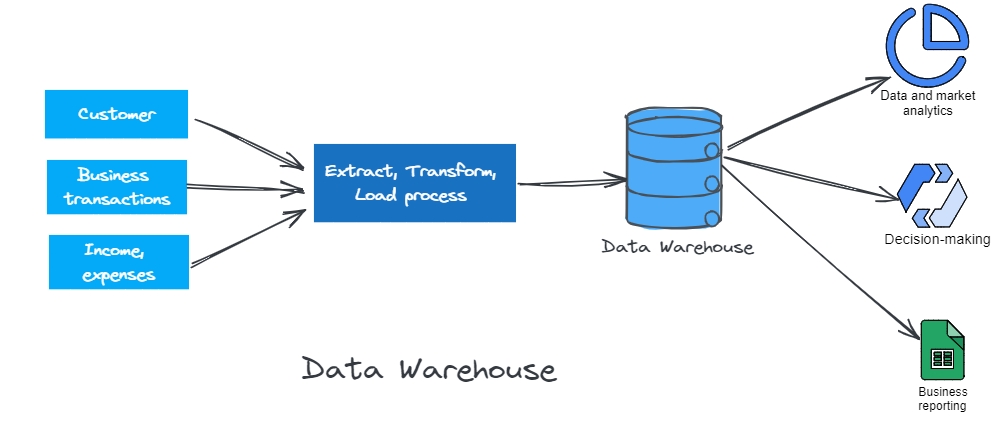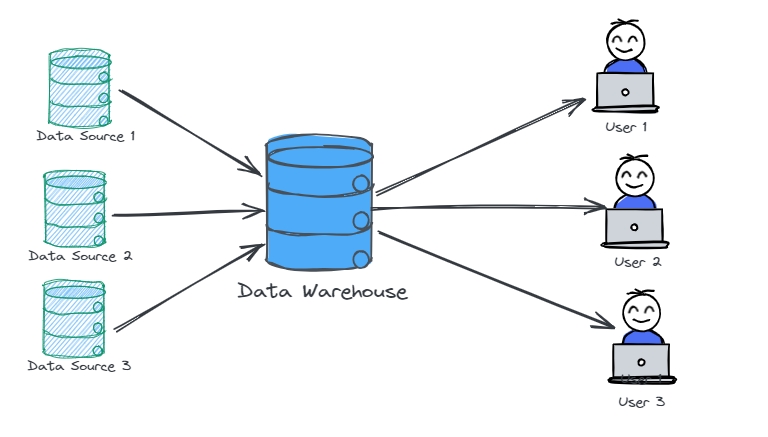Top 6 Benefits of Data Warehousing

Understanding what a data warehouse is reveals its critical role in modern data management strategies. The purpose of a data warehouse is to store, manage, and analyze vast amounts of information, which businesses rely on heavily. The benefits of a data warehouse include enhancing decision-making capabilities, improving operational efficiency, and ensuring data consistency. Over 70% of organizations report improved decision-making due to data warehousing. Automated systems can boost operational efficiency by about 35%. Recognizing the benefits of data warehousing provides valuable insights into its essential role in today's business environment.
What is Data Warehouse?
Definition and Purpose of Data Warehouse
Centralized Data Repository
A data warehouse serves as a centralized repository for storing and managing large volumes of data. This repository consolidates information from various sources, making it easier for businesses to access and analyze data. By centralizing data, organizations can streamline their data management processes and ensure that all relevant information is available in one place.

Single Source of Truth
A data warehouse provides a single source of truth for an organization. This means that all data stored in the warehouse is consistent, accurate, and reliable. By having a single source of truth, businesses can make informed decisions based on accurate data. This eliminates the confusion and errors that can arise from using multiple, inconsistent data sources.
Importance in Modern Businesses
Data Cleansing and Transformation
Data warehouses play a crucial role in data cleansing and transformation. Before data enters the warehouse, it undergoes a process of cleaning and transformation to ensure that it is accurate and consistent. This process involves removing duplicate records, correcting errors, and standardizing data formats. As a result, businesses can trust the quality of the data stored in the warehouse.
Standardization of Data Formats
Standardizing data formats is another important function of a data warehouse. Data often comes from various sources, each with its own format. A data warehouse transforms this data into a standardized format, making it easier to analyze and compare. This standardization ensures that all data is compatible and can be used effectively for reporting and analysis.
By understanding the definition, purpose, and importance of a data warehouse, businesses can appreciate its value in modern data management strategies. A data warehouse not only centralizes and standardizes data but also ensures its accuracy and reliability, providing a solid foundation for informed decision-making.
Benefits of Data Warehouse
Enhanced Data Quality and Consistency
Improved Data Accuracy
Data warehouses improve data accuracy by consolidating information from multiple sources. This process involves rigorous data cleansing and transformation. Businesses can trust the quality of their data due to these measures. Accurate data leads to better decision-making and more reliable business insights.
Elimination of Redundancies
A data warehouse eliminates redundancies by storing data in a centralized repository. This consolidation reduces duplicate records and ensures that only the most relevant information is retained. By removing unnecessary data, businesses can streamline their operations and focus on critical information.
Improved Business Intelligence
Advanced Analytics Capabilities
Data warehouses provide advanced analytics capabilities that enhance business intelligence. These capabilities include complex queries, data mining, and machine learning algorithms. Businesses can uncover hidden patterns and trends within their data. This deep analysis supports strategic planning and competitive advantage.
Predictive Analytics
Predictive analytics is another significant benefit of data warehouses. By analyzing historical data, businesses can forecast future trends and behaviors. This foresight allows companies to make proactive decisions and mitigate potential risks. Predictive analytics contributes to improved customer satisfaction and increased profitability.
Increased Efficiency and Performance
Faster Query Performance
Data warehouses offer faster query performance compared to traditional databases. Optimized storage and indexing techniques enable quick retrieval of information. Businesses can access critical data in real-time, leading to more efficient operations and timely decision-making.
Optimized Data Retrieval
Optimized data retrieval is a key feature of data warehouses. Structured storage and efficient data management practices ensure that users can quickly find the information they need. This optimization reduces the time spent on data searches and enhances overall productivity.
Scalability and Flexibility
Handling Large Volumes of Data
Data warehouses can handle large volumes of data efficiently. Businesses generate vast amounts of information daily. A data warehouse can store and manage this data without performance degradation. This capability ensures that organizations can continue to grow without worrying about data storage limitations.

Horizontal and Vertical Scaling
Data warehouses offer both horizontal and vertical scaling options. Horizontal scaling involves adding more servers to distribute the load. Vertical scaling increases the capacity of existing servers. These scaling methods provide flexibility to meet changing business needs. Organizations can choose the best approach based on their specific requirements.
Cost Savings
Reduced Storage Costs
Data warehouses help reduce storage costs. Traditional storage solutions can be expensive and inefficient. Data warehouses use advanced compression techniques to minimize storage space. This reduction in storage requirements leads to significant cost savings for businesses. Efficient data management also contributes to lower operational expenses.
Efficient Data Compression
Efficient data compression is a key feature of data warehouses. Compression algorithms reduce the size of stored data without losing information. This process allows businesses to store more data in less space. Efficient data compression improves storage utilization and reduces costs.
Enhanced Security and Compliance
Data Protection Measures
Data warehouses implement robust data protection measures. These measures include access controls, encryption, and regular audits. Protecting sensitive information is crucial for maintaining trust and compliance. Data warehouses ensure that only authorized personnel can access critical data.
Encryption and Access Controls
Encryption and access controls enhance data security in data warehouses. Encryption protects data from unauthorized access during transmission and storage. Access controls restrict data access based on user roles and permissions. These security features help businesses comply with regulatory requirements and protect sensitive information.
The benefits of data warehousing include enhanced data quality, improved business intelligence, increased efficiency, scalability, cost savings, and enhanced security. Understanding what a data warehouse is reveals its critical role in modern data management strategies. The purpose of a data warehouse is to store, manage, and analyze vast amounts of information, which businesses rely on heavily. Data warehouses provide scalability for future growth and optimized performance. Oracle's solution offers seamless scalability and effective data management.
Data warehousing solutions should be considered for business growth. These solutions offer robust data integration, strong compliance, and security. Businesses can achieve significant operational efficiencies and cost savings. Embracing data warehousing can lead to better decision-making and competitive advantages.
For your business to remain competitive in this fast-paced digital era, you must take advantage of the features and benefits of data warehousing. TapData can help you load and consolidate all of your data into your data warehouse quickly and easily.
Our data connectors enable you to effortlessly centralize your data in one location. They support rapid integration between your sources and destinations, so your team can access accurate data and make faster decisions.
With log-based change data capture (CDC), TapData can immediately identify changes made to data in a database and replicate those changes in near real-time — delivering data as frequently as 1 ~ 3 Seconds (depending upon data volume).
See Also
Harnessing Real-Time Data Sync for Cloud Data Warehousing
Optimizing Business Operations through Data Integration
Decoding Database Integration: Advantages, Practices, and Operation
Unlocking the Potential of Open Source ETL in Data Management

